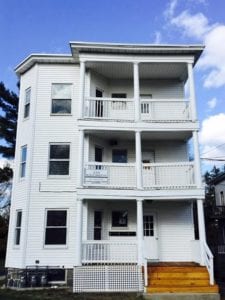John P. Wells, Broker/Owner john@wellscorealty.com

Rents are high, but so are condo values. Your multi-family may be producing great cash flow and continue to appreciate, so keeping your asset is certainly a good strategy. However, if you choose to cash out, selling the units separately is always going to be worth more than selling the whole property as one transaction. But there are many things to consider.
What’s the Value?
First of all, we need to determine the market value of the building as is. Then, is the property suitable for conversion as is, or does it need rehab? Usually, the latter is the case, as condo buyers generally want units that are in better condition than some renters are willing to accept. You may need to refinish floors, install new kitchens and baths, replace appliances and even replace windows and do exterior work. What do you need to do, what will it cost and what will be the finished value? Our Agents will help you determine that.
The conversion will require a detailed survey of the property and units, and then attorneys will have to draw up the condo documents. We can help you find a good real estate law firm to do this; we generally use Liberty Law in Boston/Newburyport. This is a substantial cost to consider.
Are You Up to the Rehab?
This is a critical question that people often don’t take into consideration. Finding a good contractor can be a challenge,  particularly in the current market. They are in high demand, and so the prices are high. Overseeing your project is time-consuming, and the market could change while you are in the process. That happened to a lot of developers in 2008 who were caught with inventory under construction when the recession hit (I was one!). Of course, conditions are very different now than they were then.
particularly in the current market. They are in high demand, and so the prices are high. Overseeing your project is time-consuming, and the market could change while you are in the process. That happened to a lot of developers in 2008 who were caught with inventory under construction when the recession hit (I was one!). Of course, conditions are very different now than they were then.
What About the Tenants?
Under Massachusetts Law you cannot evict them with the intent to convert; if you evict and then start the conversion process you can find yourself in hot water. Don’t try that, stick to the law:
- Landlords must serve a notice of intent to each tenant, informing the tenants that they intend to convert the property into condo units and have filed a master deed or are converting the building into a co-op.
- The tenant has either one year or until the end of their lease – depending on which period is greater – to move from the property.
- The tenant has the right to buy their own unit for up to three months (90 days) after being given a purchase and sale agreement by the owner. The owner must sign the sale agreement, and this agreement must have terms that are as good or better than the conditions and terms of sale being offered to the general public.
In addition, the state condo law allows towns and cities to adopt, by a two-thirds vote of their local legislative bodies, local ordinances or bylaws regulating condominium conversion that are stronger than, or which otherwise differ from, the statewide law. To get a copy of your local ordinance or bylaw, contact your city or town hall. In any case, your building will be inspected by the building and/or health inspectors to ensure that everything is up to code.
At Wellsco Realty and MultiFamilyProperties.com we are standing by to assist and guide you through this process. Call us at (617) 212-3251 learn more.
About the Author
 John P. Wells, Broker/Owner john@wellscorealty.com
John P. Wells, Broker/Owner john@wellscorealty.com
John Wells has worked in real estate for over 12 years. He has planned communities, designed and built homes, and represented countless buyers in their quest for the best home for their needs. John works with top-notch professionals to help plan financing, inspect prospective purchases and protect his client’s legal interests.


